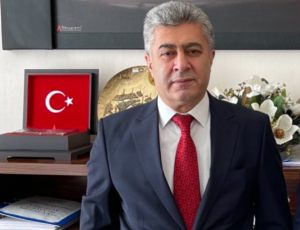Abdullah Bozkurt/Stockholm
Turkey’s highest appellate court overturned the conviction of Islamic State in Iraq and Syria (ISIS) suicide bomber Ahmet Aselihi, a 33-year-old Syrian national who infiltrated a refugee group in order to cross into Turkey but was caught without completing his mission.
In a decision rendered by the Supreme Court of Appeals (Yargıtay) on March 10, 2022, the court said the police did not conduct a through investigation into Aselihi’s links to ISIS and threw out the conviction on terrorism charges handed down by a lower court.
The case originated in 2016, when the Doğanpınar gendarmerie outpost in Turkey’s border town of Oğuzeli in Gaziantep province intercepted intelligence which indicated that ISIS would smuggle explosives into Turkey using a refugee group as cover, part of planned suicide terror attacks in major Turkish cities. The intelligence was specific in revealing where the explosives would be handed over to ISIS operatives.
The gendarmerie set up a trap in the neighborhood where the explosives would be brought in on February 9, 2016 in the middle of the night. Aselihi showed up with two backpacks at around 10 p.m. and started to run when he spotted the gendarmerie. He dumped the backpacks by the side of the road and managed to escape in the dark through nearby olive groves.
The backpacks included four suicide vests, 48 blocks of explosives, 10 electric detonators, four hand grenades, one Beretta handgun, a silencer, detonating cords, bullets, batteries and tape. The gendarmerie replaced the explosives, guns and ammunition with dummy weights, hoping that the fugitive would return to pick up the backpacks that he had left on the roadside.
Supreme Court of Appeals ruling overturning the conviction of the ISIS terrorist:
As expected, three hours later Aselihi returned to the scene in a Ford vehicle to collect the bags. He put them in the trunk and sped away but did not go too far before his vehicle was caught by road spikes and he was quickly apprehended. His cell phone storage included videos and photos of the ISIS terrorist group as well.
He was indicted, convicted and sentenced to prison at the end of his trial at the Gaziantep 2nd High Criminal Court. During the court proceedings, Aselihi claimed he was not the same man who dumped the backpacks and said his friend from Syria called him to ask him to collect the bags, which he thought included personal possessions.
However a forensic examination found Aselihi’s fingerprints on the suicide vests as well as the explosives, confirming that he was the same person who had left the bags and later came to retrieve them. The ruling was upheld by a regional appellate court (Gaziantep Bölge Idare Mahkemesi) as well.
In its decision the Third Chamber of the Supreme Court of Appeals did not make a single reference to the fingerprints and instead claimed an inadequate investigation had been conducted by the gendarmerie in determining whether Aselihi was the man who dumped the explosives-laden bags on the roadside. The chamber unanimously ruled to overturn the conviction.

The Supreme Court of Appeals’ 3rd Chamber (previously the 16th), which reviews appeals of terrorism convictions, is staffed with Islamists and nationalists who sympathize with jihadist ideologies. The chanber has a track record of acquitting, releasing and/or overturning the conviction of armed jihadists who were convicted in lower courts.
At the same time, the chamber has been very harsh in upholding sentences of political dissidents, critics, opponents and journalists who were wrongfully convicted on trumped-up terrorism charges at the request of the Islamist government of President Recep Tayyip Erdoğan.
The 16th Chamber, which specifically reviews terrorism cases, was created in 2014 with a special bill endorsed by the Erdoğan government to transform the country’s top appeals court. In a bizarre change, the new chamber was mandated to look all terrorism cases, which had been reviewed by the 9th Chamber for decades. The government recruited 140 new judges in 2014 and another 100 in 2018 to dominate the appeals court. The judges who were named to the chamber were carefully vetted by the Erdoğan government, and the bench was filled with loyalists.
Since December 2014 until last year, the chamber was led by a man named Eyüp Yeşil, a 63-year old judge who was described as a hard-core Islamist. In his youth he was closely associated with the Islamist National Salvation Party and National View (Milli Görus) ideology to which Erdoğan subscribes.

For his services to President Erdoğan, in a blatant abuse of the criminal justice system that cracked down on the opposition but remained forgiving and lenient to dangerous jihadists, Yeşil was promoted to deputy president of the Supreme Court of Appeals in 2021. He also assumed the role of presiding over the general tribunal of the supreme court, meaning that he will continue to play a key role in all referrals made to the tribunal by the chambers.
He was succeeded by Muhsin Şentürk, the deputy chairman of the chamber who had worked with Yeşil in criminalizing Edogan’s opponents and critics under abusive terrorism laws. Until he became part of the 3rd Chamber, Şentürk had never worked on or reviewed any terrorism cases during the course of his entire career. He mostly worked as an investigating judge in cases of forestry law violations. Yet surprisingly the government installed him in the most critical chamber of the supreme court that deals with complicated terrorism cases.
The first thing he did as a member of the chamber was to help fast track the upholding of a politically motivated ruling made by a local court that branded the Gülen movement, a faith-based group critical of the Erdoğan government on a range of issues from corruption in the administration to Erdoğan’s aiding and arming jihadist groups, as a terrorist entity. This flawed ruling helped Erdoğan criminalize opposition groups in Turkey.

Jihadist Aselihi’s case is not the only ISIS case that the judges of the 3rd Chamber of the Supreme Court of Appeals have overturned. A survey of cases in recent years shows that the judges in that chamber have ruled in many ISIS cases to overturn convictions and order the release of jihadist militants. As a result, the bulk of the successful ISIS convictions, already rare in the lower courts of the Turkish judicial system, have been thrown out by senior judges who appear to follow the lenient guidelines of the Islamist government when it comes to cracking down on jihadist groups.
Turkish officials do not disclose the number of successful convictions in ISIS cases and how many convictions were in fact upheld on appeal. They decline to respond to parliamentary questions asking for such information. Instead, they often float figures on the number of detentions and in some cases arrests, which in many cases result in acquittal and release.
Thousands of militants, both Turkish and foreign, have used Turkish territory to cross into Syria with the help of smugglers in order to fight alongside ISIS and al-Qaeda groups there. Turkish intelligence agency MIT has facilitated their travel. Turkish authorities knew and monitored human smugglers who helped jihadists travel in and out of Syria through the Turkish border but often overlooked their activities.












